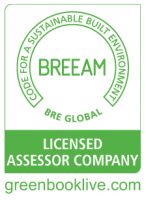Air Conditioning Inspections (ACIs)
Under the Energy Performance of Buildings (England and Wales) Regulations 2012, as amended in 2020 (the EPB regulations), anyone who manages or controls the operation of an air conditioning (AC) system – such as the building owner or the facilities manager – with an effective rated output of more than 12 kW needs to ensure that an accredited AC energy assessor regularly (i.e. at least once every five years) inspects it in accordance with the Chartered Institution of Building Services Engineers (CIBSE)’s ‘TM44: Inspection of air conditioning systems: a guide to EPBD compliance’ (CIBSE TM44 guidance).
This applies to England and Wales only. Buildings in Northern Ireland and Scotland are subject to separate regulatory requirements.
An AC system inspection by an accredited AC energy assessor is designed to improve efficiency, reduce energy consumption, reduce operating costs and reduce carbon emissions. The energy assessor will highlight how the operation of existing systems can be improved or opportunities to replace older, less energy efficient systems, or oversized systems, with new energy efficient systems.
As the replacement of refrigerant is restricted in older systems (as established in other legislation), there is an additional incentive to improve or replace older systems with more modern energy efficient units.
The regulations require, for all systems first put into service on or after 1st January 2008, the first inspection must have taken place within five years of the date when the system was first put into service.
Only air conditioning systems with an effective rated output of more than 12kW are affected by these regulations. This will include systems consisting of individual units which are less than 12 kW, but whose combined effective rated output is more than 12 kW.
The effective rated output is the maximum calorific output in kW stated by the manufacturer of the system as delivered during continuous operation while complying with the useful efficiency indicated by the manufacturer.
One or more air conditioning units within a building controlled by a single person are considered to comprise a single air conditioning system for the purposes of the regulations.
‘Air conditioning system’ means a combination of all components required to provide a form of air treatment in which the temperature is controlled or can be lowered; and includes systems which combine such air treatment with the control of ventilation, humidity and air cleanliness (as defined in The Energy Performance of Buildings (England and Wales) Regulations 2012 (as amended)).
There is no exemption within the regulations which restricts the inspection and maintenance of systems to those purely for the comfort of occupants. Refrigeration provided solely for process applications, such as cold stores and pharmaceutical production, can be inspected.
Who is responsible for the ACI?
The person who controls the operation of the system is regarded as the person who controls the technical functioning of the system, not someone who does no more than adjust the temperature or whose only responsibility is to adjust the controls. The owner of the system will usually control the operation of the system even where day-to-day operation is contracted out to another person or organisation. Where the occupier of the building takes total responsibility for a building and its services (e.g. full repairing and insuring lease), then the occupier will control the system.
Where the operation and management of the system is carried out on a day-to-day facilities management basis, or a servicing company provides routine servicing and maintenance, the contract may specify the facilities management, or servicing company, as the controller of the system with responsibility for ensuring that inspections are carried out. Depending on the terms of the contract the facilities management or servicing company may become responsible under the regulations also. In such cases, however, the landlord or building occupier retains a parallel duty to ensure that an air conditioning system has been inspected.
Where air conditioning systems are installed locally by the building occupier, the responsibility will lie with the occupier as they own the system.
The air conditioning inspection report must be kept in a safe place so that it can be used to inform subsequent inspections or passed to a new system owner or manager. The ACI report should be kept with maintenance and/or other energy records, for example, in a building log book. Newer buildings may already be provided with a building log book satisfying the requirements of Part L of the Building Regulations to provide the building owner or manager with information about the building, its fixed services and their maintenance requirements. The building log book would normally be the most suitable place to keep records of the air conditioning inspection, together with other such inspection results e.g. fluorinated greenhouse gas inspections. Where a log book does not exist, it would be useful to keep air conditioning inspection records in a relevant section of the building’s operation and maintenance documents.
Other information it would be helpful to keep in the building log book or if a log book is not available, with the building’s operation and maintenance documents would be the preparatory details for packaged cooling systems or for centralised cooling systems. Information that would be helpful to retain includes:
- a copy of the fully signed air conditioning inspection report of the air conditioning inspection produced by the energy assessor
- the recommendation report and any data used to prepare an EPC for the building (where one has been produced)
- the recommendation report produced to accompany a DEC (if one is required)
- the reports from any other regular inspections, such as inspections for refrigerant leakage, involving the building’s air conditioning or heating systems
This information can then be provided for subsequent inspections and it may help to minimise the time needed to carry out an inspection.
Rule of thumbs to determine whether your building requires an ACI
| Activity which typically requires 12 kW of cooling | Floor area |
|---|---|
| Air conditioning general office spaces Assuming typical levels of electrical equipment and 8-10 m2 per person | 200 m2 |
| Air conditioned offices with high levels of IT electrical equipment | 100 m2 |
| Office, call centre or dealing floors with high occupation densities of 6 m2 or similar and high levels of IT, communication or lighting loads may well fall within the scope at smaller areas. | |
| Retail spaces with average levels of display lighting | 250 m2 |
| Retail spaces with high levels of display lighting and illuminated cabinets | 150 m2 |
Lodgement on the central register
From 6th April 2012 it became a statutory requirement for the energy assessor to lodge all ACI reports on the register. To be valid, any ACI report produced on or after this date must be lodged on the register. When an ACI report is lodged it will be allocated a unique report reference number. Reports produced before 6 April 2012 may have been lodged on the register on a voluntary basis.
Statutory lodgement was introduced to protect the consumer and to ensure that only accredited energy assessors can undertake inspections and prepare subsequent reports. Statutory lodgement enables the building owner or manager to verify the identity of the energy assessor and for accreditation schemes to monitor the standard of the air conditioning inspection reports which have been produced. Statutory lodgement also enables lost and mislaid air conditioning inspection reports to be replaced easily at no additional cost to the building owner or manager.
The building owner or manager will be able to check the validity of the air conditioning inspection report by accessing an online copy of the air conditioning inspection report. A copy of the air conditioning inspection report can be downloaded from the register website using the report reference number.
An air conditioning inspection report can also be downloaded from the register website using the building address, if the report reference number has been mislaid, unless the building owner has ‘opted out’ of making the report available in this way.
Penalties
Local Weights and Measures Authorities (usually Trading Standards Officers) are responsible for enforcing the requirements relating to air conditioning inspection reports. Failure to commission, keep, or provide an air conditioning inspection report when required by the regulations means that a penalty charge notice may be issued to those in breach of the requirements. Trading Standards Officers may act on complaints or undertake investigations. They may request that a copy of the air conditioning inspection report is provided to them. If requested, the building owner or manager must provide this information within seven days of the request being made or be liable to a penalty charge notice for failing to do so. A copy of an air conditioning inspection report can be requested by a Trading Standards Officer at any time up to six months after the last day for compliance with the obligation to make it available.
The first penalty for failing to have an air conditioning inspection report is fixed in the regulations and is currently £300.
Occupiers of a building, where a central air conditioning system is under the control of the building owner or manager, would not be liable for a penalty charge for any breach of the duties. A further penalty can be issued for failure to provide a Trading Standards Officer with a copy of the air conditioning inspection report within seven days when requested to do so.
The second penalty is fixed at £200.
If a penalty charge notice is issued, but that person believes it should not have been issued, they can request a review. If that person is not satisfied with the outcome of the review, they may appeal to the county court within 28 days after they are given notice confirming the penalty charge notice by the Local Weights and Measures Authority.
If the building owner or manager wants to sell or let a building with an air conditioning system, which should have been inspected, then it is very likely that the legal advisors of the prospective tenant or buyer will require sight of the air conditioning inspection report during the legal processes prior to sale or let. Failure to have an air conditioning inspection report, where one is required, may have a negative impact on the transaction process.









